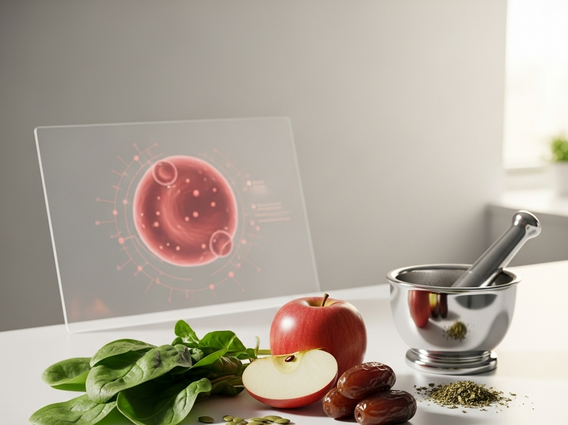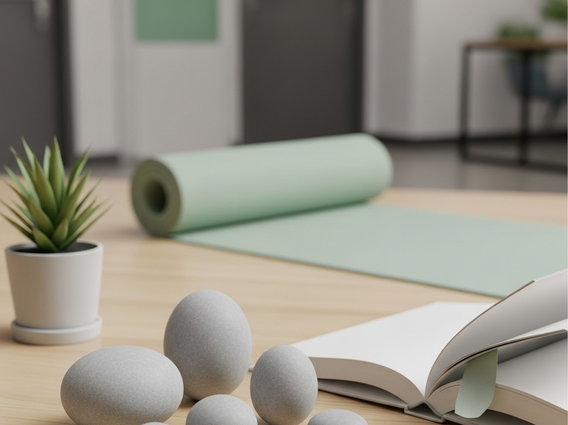Natural Remedies for Anemia
Anemia is a common condition characterized by a lack of healthy red blood cells, leading to symptoms like fatigue and weakness. While medical treatment is often necessary, many individuals explore natural remedies for anemia to support their health, manage symptoms, and improve their overall well-being.

Key Takeaways
- Dietary changes, focusing on iron-rich foods and absorption enhancers, are fundamental natural remedies for anemia.
- Certain herbal treatments for low iron can complement dietary efforts, but require careful consideration and professional guidance.
- Essential vitamins and supplements for anemia, such as iron, B12, and folate, play a crucial role in managing the condition naturally.
- Lifestyle adjustments and home remedies for anemia symptoms can significantly improve quality of life.
- Always consult a healthcare professional before starting any new natural remedies, especially when dealing with anemia.
Understanding Anemia and Natural Remedies for Anemia
What is Anemia and Its Common Causes?
Anemia is a condition in which your blood lacks healthy red blood cells. Red blood cells carry oxygen to the body’s tissues, and without enough of them, you can feel tired and weak. The most common type is iron-deficiency anemia, which occurs when your body doesn’t have enough iron to produce hemoglobin, the protein in red blood cells that binds oxygen.
Common causes of anemia include:
- Inadequate dietary iron intake.
- Blood loss, often from heavy menstruation, ulcers, or internal bleeding.
- Inability to absorb iron due to conditions like celiac disease or Crohn’s disease.
- Pregnancy, which increases iron requirements.
- Chronic diseases that interfere with red blood cell production.
Why Explore Natural Remedies for Anemia?
While conventional medical treatments are vital for diagnosing and managing anemia, many people seek complementary approaches. Exploring natural remedies for anemia can offer a holistic path to support the body, alleviate symptoms, and address potential nutritional deficiencies. These methods often focus on dietary improvements, herbal support, and lifestyle changes, aiming to improve iron levels and overall vitality in a sustainable way.
The appeal of natural remedies lies in their potential to work synergistically with medical treatments, offering a broader spectrum of support for individuals looking to enhance their health naturally.
Dietary Natural Remedies for Anemia
Iron-Rich Foods: Best Natural Ways to Increase Iron
Diet plays a pivotal role in managing and preventing anemia, particularly iron-deficiency anemia. Incorporating iron-rich foods into your daily meals is one of the best natural ways to increase iron levels in your body. Iron comes in two main forms: heme iron (found in animal products) and non-heme iron (found in plant-based foods).
Here are some excellent sources:
- Heme Iron Sources:
- Red meat (beef, lamb, venison)
- Poultry (chicken, turkey)
- Fish (salmon, tuna, sardines)
- Shellfish (clams, oysters, mussels)
- Non-Heme Iron Sources:
- Legumes (lentils, beans, chickpeas)
- Spinach and other dark leafy greens
- Tofu and tempeh
- Fortified cereals and breads
- Pumpkin seeds, sesame seeds
- Dried fruits (raisins, apricots)
Enhancing Iron Absorption: Diet for Anemia Natural Treatment
Simply consuming iron-rich foods isn’t always enough; maximizing absorption is key. Certain dietary components can significantly enhance or inhibit iron uptake. A well-planned diet for anemia natural treatment focuses on pairing foods strategically to boost bioavailability.
Consider these tips for better absorption:
- Pair with Vitamin C: Vitamin C dramatically increases the absorption of non-heme iron. Consume citrus fruits, bell peppers, broccoli, and strawberries alongside iron-rich plant foods.
- Avoid Inhibitors: Certain substances can hinder iron absorption. These include phytates (found in whole grains and legumes), tannins (in tea and coffee), and calcium (in dairy products). Try to consume these separately from iron-rich meals.
- Cook in Cast Iron: Cooking in cast iron cookware can leach small amounts of iron into your food, providing a minor but consistent boost.
Plant-Based Natural Remedies for Anemia
For those following a vegetarian or vegan diet, focusing on specific plant-based natural remedies for anemia is crucial. While non-heme iron is less readily absorbed than heme iron, a thoughtful approach can ensure adequate intake. Combining various plant sources and absorption enhancers is vital.
Here’s a comparison of some iron-rich plant foods and their absorption enhancers:
| Food Item | Iron Content (per serving) | Absorption Enhancers | Absorption Inhibitors |
|---|---|---|---|
| Lentils (1 cup cooked) | 6.6 mg | Vitamin C (e.g., bell peppers) | Phytates (soak/sprout before cooking) |
| Spinach (1/2 cup cooked) | 3.2 mg | Vitamin C (e.g., lemon juice) | Oxalates (cook thoroughly) |
| Tofu (1/2 cup firm) | 3.4 mg | Vitamin C (e.g., broccoli) | Phytates |
| Pumpkin Seeds (1/4 cup) | 4.2 mg | Vitamin C (e.g., oranges) | Phytates |
Remember that soaking, sprouting, and fermenting legumes and grains can reduce phytate content, further improving iron absorption.
Herbal Natural Remedies for Anemia
Top Herbal Treatments for Low Iron
Certain herbs have been traditionally used to support blood health and address low iron levels. These herbal treatments for low iron often work by providing trace minerals, supporting nutrient absorption, or stimulating red blood cell production. It is important to approach herbal remedies with caution and always consult a healthcare professional before use, especially if you are pregnant, breastfeeding, or taking other medications.
Some commonly suggested herbs include:
- Nettle (Urtica dioica): Rich in iron, vitamin C, and chlorophyll, nettle is often used as a nourishing tonic. It can be consumed as a tea or added to soups and stews.
- Dandelion (Taraxacum officinale): Both the leaves and roots of dandelion are believed to support liver function, which plays a role in blood health. It also contains iron and other minerals.
- Yellow Dock (Rumex crispus): Known for its iron content and its traditional use as a blood builder and mild laxative, yellow dock is often used in tinctures or capsules.
- Alfalfa (Medicago sativa): A highly nutritious herb, alfalfa is rich in vitamins (including K and C) and minerals, which can support overall blood health.
Traditional Herbal Remedies for Anemia Symptoms
Beyond directly supporting iron levels, some traditional herbal remedies for anemia symptoms focus on alleviating the associated discomforts such as fatigue, weakness, and poor circulation. These herbs often act as adaptogens or tonics, helping the body cope with stress and improve overall energy.
- Siberian Ginseng (Eleuthero): An adaptogenic herb that can help combat fatigue and improve stamina, often beneficial for those experiencing chronic tiredness due to anemia.
- Red Raspberry Leaf (Rubus idaeus): While often associated with women’s health, red raspberry leaf is rich in vitamins and minerals, including iron, and can be a nourishing tonic for general well-being.
- Hawthorn (Crataegus monogyna): Traditionally used to support cardiovascular health, which can be beneficial for individuals whose anemia impacts heart function.
Safe Use of Herbal Remedies for Anemia
While natural, herbal remedies are potent and can interact with medications or have side effects. It is crucial to ensure the safe use of herbal remedies for anemia. Always source herbs from reputable suppliers to ensure purity and potency. Start with low doses and monitor your body’s response.
Key considerations for safe use:
- Consult a Professional: Always discuss any herbal treatments with your doctor or a qualified herbalist, especially if you are pregnant, breastfeeding, or have underlying health conditions.
- Dosage and Duration: Adhere to recommended dosages and do not use herbs for prolonged periods without professional guidance.
- Interactions: Be aware of potential interactions with prescription medications, including iron supplements.
- Quality: Choose organic, non-GMO, and third-party tested products to avoid contaminants.
Vitamins & Supplements as Natural Remedies for Anemia
Essential Vitamins and Supplements for Anemia
When dietary intake alone isn’t sufficient, specific vitamins and supplements for anemia can play a critical role in restoring healthy blood levels. Iron supplements are often the primary recommendation for iron-deficiency anemia, but other nutrients are also vital for red blood cell production and overall blood health.
Key supplements include:
- Iron: Available in various forms (ferrous sulfate, ferrous gluconate, ferrous fumarate, iron bisglycinate). Iron bisglycinate is often preferred for its higher absorption and lower gastrointestinal side effects.
- Vitamin C: As mentioned, Vitamin C significantly enhances non-heme iron absorption. It’s often included in iron supplements or recommended to be taken alongside them.
- Vitamin B12: Essential for red blood cell formation and neurological function. Deficiency can lead to megaloblastic anemia. Found primarily in animal products, so vegetarians and vegans may require supplementation.
- Folate (Vitamin B9): Works with Vitamin B12 in red blood cell production. Deficiency can also cause megaloblastic anemia. Found in leafy greens, legumes, and fortified foods.
- Copper: Plays a role in iron metabolism and red blood cell formation.
Choosing Natural Supplements to Increase Iron
When selecting supplements to increase iron, it’s important to consider bioavailability, potential side effects, and overall quality. Not all iron supplements are created equal, and choosing wisely can make a significant difference in effectiveness and tolerability.
Tips for choosing natural iron supplements:
- Form of Iron: Opt for highly absorbable forms like iron bisglycinate, which is gentle on the stomach and less likely to cause constipation.
- Combination Formulas: Some supplements combine iron with Vitamin C, B12, and folate, which can be beneficial for comprehensive blood support.
- Quality and Purity: Look for supplements from reputable brands that undergo third-party testing to ensure purity, potency, and absence of contaminants.
- Dosage: Follow your healthcare provider’s recommendations for dosage, as excessive iron intake can be harmful.
Lifestyle & Home Natural Remedies for Anemia Symptoms
Managing Anemia Symptoms with Home Remedies
Beyond diet and supplements, certain lifestyle adjustments and home remedies for anemia symptoms can significantly improve comfort and energy levels. These approaches focus on supporting overall well-being and mitigating the daily challenges posed by anemia.
- Prioritize Rest: Fatigue is a hallmark symptom of anemia. Ensuring adequate sleep and incorporating short rest periods throughout the day can help manage energy levels.
- Stay Hydrated: Drinking plenty of water supports overall bodily functions, including circulation and nutrient transport.
- Moderate Exercise: Gentle, consistent exercise, such as walking or yoga, can improve circulation and energy over time, but avoid overexertion, especially when severely anemic.
- Stress Reduction: Chronic stress can deplete the body’s resources. Practices like meditation, deep breathing, or spending time in nature can help manage stress.
Holistic Approaches: Natural Remedies for Anemia
A holistic perspective considers the interconnectedness of mind, body, and spirit in addressing health conditions. When exploring natural remedies for anemia, integrating holistic practices can foster a more comprehensive healing environment.
This includes:
- Mindfulness and Meditation: These practices can reduce stress, improve sleep quality, and enhance the body’s natural healing capabilities.
- Adequate Sleep Hygiene: Establishing a regular sleep schedule and creating a conducive sleep environment can profoundly impact energy levels and recovery.
- Gentle Movement: Activities like tai chi or gentle stretching can improve circulation and muscle strength without overtaxing an anemic body.
- Connection with Nature: Spending time outdoors can reduce stress and improve mood, contributing to overall well-being.
These holistic natural remedies for anemia work by supporting the body’s inherent ability to heal and maintain balance, complementing the more direct nutritional and herbal interventions.
Implementing Natural Remedies for Anemia for Lasting Health
Combining Natural Remedies for Anemia Effectively
The most effective approach to managing anemia naturally often involves combining various strategies. Integrating dietary changes, appropriate supplementation, herbal support, and lifestyle adjustments creates a synergistic effect that addresses multiple facets of the condition. For instance, consuming iron-rich foods with Vitamin C, while also taking a targeted iron supplement and managing stress, can yield better results than relying on a single method.
A personalized plan, developed in consultation with healthcare professionals, is crucial for optimizing the combination of natural remedies for anemia to suit individual needs and the specific type of anemia.
Monitoring Progress: Pathways to Naturally Improving Anemia
For those seeking to understand how to cure anemia naturally, it’s important to recognize that “cure” implies a complete resolution, which often requires medical intervention, especially for severe cases or underlying causes. However, significant improvement and management are highly achievable through natural means. Monitoring progress is essential to ensure that these natural remedies are effective and to adjust the approach as needed.
Regular blood tests, including complete blood count (CBC) and ferritin levels, are vital for tracking changes in iron stores and red blood cell parameters. Additionally, paying attention to symptom improvement—such as increased energy, reduced fatigue, and improved concentration—provides valuable feedback on the efficacy of your chosen natural remedies. Consistent communication with your doctor about your progress and any changes in your health is paramount.
When to Seek Medical Advice for Anemia
While natural remedies can be highly supportive, they are not a substitute for professional medical diagnosis and treatment. It is crucial to seek medical advice for anemia in several situations. If you suspect you have anemia, experience severe or worsening symptoms, or if natural remedies do not seem to be improving your condition, consult your doctor immediately.
Anemia can sometimes be a symptom of a more serious underlying health issue, such as internal bleeding, chronic disease, or malabsorption disorders, which require specific medical intervention. Your doctor can accurately diagnose the type and cause of your anemia and recommend the most appropriate course of action, which may include prescription iron supplements, dietary counseling, or treatment for the underlying cause.
Disclaimer: The information provided in this article is for educational and supportive purposes only and does not constitute medical advice. It is not intended to diagnose, treat, cure, or prevent any disease. Always consult with a qualified healthcare professional before making any decisions about your health or starting any new dietary, herbal, or supplement regimen, especially if you have a medical condition, are pregnant, nursing, or taking medications. This information does not replace the advice of a medical doctor.






Warning: Undefined variable $aria_req in /var/www/html/wp-content/themes/Impreza-child/comments.php on line 51
Warning: Undefined variable $aria_req in /var/www/html/wp-content/themes/Impreza-child/comments.php on line 56
Warning: Undefined variable $aria_req in /var/www/html/wp-content/themes/Impreza-child/comments.php on line 67
Warning: Undefined variable $aria_req in /var/www/html/wp-content/themes/Impreza-child/comments.php on line 70
Warning: Undefined variable $aria_req in /var/www/html/wp-content/themes/Impreza-child/comments.php on line 73